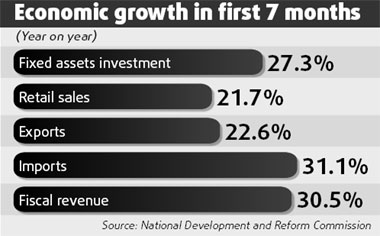Rapidly growing fiscal revenue helped the country reduce its central fiscal deficit last year, despite heavy investment in rural and western regions, Finance Minister Xie Xuren Wednesday.
Administration for Industry and Commerce officers check the quality of mooncakes in a supermarket in Fuyang, Anhui province on August 27, ahead of the Sept 14 Mid-Autumn Festival. [Lu Qijian]
In the first seven months, China's fiscal revenue reached 4.09 trillion yuan ($598 billion), up 30.5 percent year-on-year, Xie said.

Despite slowing momentum in July, when annualized fiscal revenue growth was only 16.5 percent, revenue in the January-July period reached almost 70 percent of the national budgeted incomes set at the National People's Congress (NPC) in March, Xie said.
The stock trading tax also increased 7 percent in the first seven months, Xie said in his report to the fourth session of the Standing Committee of the 11th NPC, China's top legislature. In July, the tax slumped 71.8 percent year-on-year, following a lackluster market that has slumped more than 60 percent from its October peak.
The country's fiscal expenditure amounted to 2.74 trillion yuan in the first seven months, up 29.7 percent year-on-year. The expenditure accounted for 45.1 percent of the budgeted expenditures, Xie said.
The central fiscal deficit decreased to 200 billion yuan last year, from 245 billion yuan in 2006. Its ratio to the country's GDP last year dropped to 0.8 percent from 1.3 percent in 2006.
Since Sichuan and its neighboring provinces suffered the devastating earthquake in May, the State has also earmarked special funding to aid recovery and support post-quake reconstruction in Sichuan province and neighboring regions, Xie said.
By Monday, the finance ministry provided support worth 27.5 billion yuan for quake relief. It also adjusted its annual budget to accommodate a post-quake reconstruction fund of 70 billion yuan.
Last year, the State coffers transferred 712.5 billion yuan to middle and western regions to encourage balanced regional development, up 38 percent year-on-year, the finance minister said.
China formally initiated its "western development" drive in 2000 through capital injection and preferential policies to narrow the development gap between its prosperous eastern provinces and economically backward middle and western regions, with focus on education, social causes, the environment and economic growth.
The State also increased investment last year in the rural cooperative medical system, in which farmers pay a small sum of money to join the system mainly subsidized by central and provincial authorities. To date, 86 percent of China's counties have reportedly put the system in place.
(China Daily August 28, 2008)